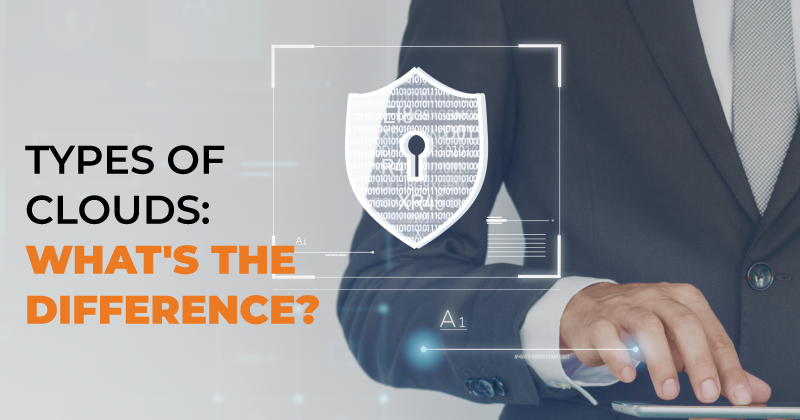What are the types of clouds? Which one’s best for your business?
 When you think of cloud technology, the first thing that comes to mind is big companies like Google and Amazon using it to run their massive online operations. But the truth is, this type of software has many small-time entrepreneurs using it to run their businesses. And if you’re not sure which kind of cloud computing service is right for your business, here’s a brief explanation about the different types of clouds and why you should choose one over the other.
When you think of cloud technology, the first thing that comes to mind is big companies like Google and Amazon using it to run their massive online operations. But the truth is, this type of software has many small-time entrepreneurs using it to run their businesses. And if you’re not sure which kind of cloud computing service is right for your business, here’s a brief explanation about the different types of clouds and why you should choose one over the other.
What is a Hybrid Cloud?
The hybrid cloud integrates private cloud services, public cloud services, and on-premises infrastructure. It provides management, orchestration, and application portability over all three cloud services. As a result, a unified, single, and flexible distributed computing environment is formed. An organization can deploy and scale its cloud-native or traditional workloads on the appropriate cloud model.
The hybrid cloud includes the public cloud services from multiple cloud service providers. It enables organizations to
- Choose the optimized cloud environment for each workload
- Combine the best cloud services and functionality from multiple cloud vendors.
- Move workloads between private and public cloud as circumstances change.
A hybrid cloud helps organizations achieve their business and technical objectives cost-efficiently and more effectively than the private or public cloud alone.
Hybrid Cloud Architecture
Hybrid cloud architecture focuses on transforming the mechanics of an organization’s on-premises data center into the private cloud infrastructure and then connecting it to the public cloud environments hosted by a public cloud provider. Uniform management of private and public cloud resources is preferable to managing cloud environments individually because it minimizes the risk of process redundancies.
The hybrid cloud architecture has the following characteristics.
1. Scalability and resilience
Use public cloud resources to scale up and down automatically, quickly, and inexpensively to increase traffic spikes without affecting private cloud workloads.
2. Security and regulatory compliance
Use private cloud resources for highly regulated workloads and sensitive data, and use economic public cloud resources for less-sensitive data and workloads.
3. Enhancing legacy application
Use public cloud resources to improve the user experience of existing applications and extend them to new devices.
4. The rapid adoption of advanced technology
You can switch to cutting-edge solutions and integrate them into existing apps without provisioning new on-premises infrastructure.
5. VMware migration
Shift existing on-premises infrastructure and workloads to virtual public cloud infrastructure to reduce on-premises data center footprint and scale according to requirements without additional cost.
6. Resource optimization and cost savings
Execute workloads with predictable capacity on the private cloud and move variable workloads to the public cloud.
Hybrid cloud advantages
The main advantages of a hybrid cloud include the following.
- Cost management_ Organizations operate the data center infrastructure with a private cloud. It requires a significant expense and fixed cost. However, a public cloud provides services and resources accounted for as operational and variable expenses.
- Flexibility_ An organization can build a hybrid cloud environment that works for its requirements using traditional systems and the latest cloud technology. A hybrid setup allows organizations to migrate their workloads to and from the traditional infrastructure to the vendor’s public cloud.
- Agility and scalability_ Hybrid cloud provides more resources than a public cloud provider. This makes it easier to create, deploy, manage, and scale resources to meet demand spikes. Organizations can burst the application to a public cloud when demand exceeds the capacity of a local data center to access extra power and scale.
- Interoperability and resilience_ A business can run workloads in public and private environments to increase resiliency. Components of one workload can run in both environments and interoperate.
Reference Link
https://www.ibm.com/cloud/learn/hybrid-cloud
What is a Public Cloud?
A public cloud is a computing service provided by third-party service providers across the public Internet. It is available to anyone who wants to use these services or purchase them. These services may be free or sold on-demand, allowing users to pay per usage for the storage, bandwidth, or CPU cycles they consume. Public clouds can save organizations from the cost of buying, maintaining, and managing on-premises infrastructure.
The public cloud can be deployed faster than on-premises and is an infinitely scalable platform. Each employee of an organization can use the same application from any branch through their device of choice using the Internet. Moreover, they run in multi-tenant environments where customers share a pool of resources provisioned automatically and allocated to individual users via a self-service interface. Each user’s data is isolated from others.
 Public cloud architecture
Public cloud architecture
A public cloud is a completely virtualized environment that relies on a high-bandwidth network to transmit data. Its multi-tenant architecture lets users run the workload on shared infrastructure. Cloud resources can be duplicated over multiple availability zones for protection against outages and redundancy.
Cloud service models categorize public cloud architecture. Here are the three most common service models.
- Infrastructure-as-a-Service_ in which third-party providers host infrastructure resources, such as storage and servers, and virtualization layer. They offer virtualized computing resources, such as virtual machines, over the Internet.
- Software-as-a-Service_ in which third-party service providers host applications and software and make them available to customers across the Internet.
- Platform-as-a-Service_ in which third-party service providers deliver software and hardware tools for application development, such as operating systems.
Advantages of Public Cloud
The public cloud has the following advantages
1. Scalability
Cloud resources can be expanded rapidly to meet traffic spikes and user demand. Public cloud users can gain high availability and greater redundancy in separated cloud locations. Apart from the availability and redundancy, public cloud customers get faster connectivity between the end-users and cloud services using the network interfaces. However, latency and bandwidth issues are still common.
2. Access to advanced technologies
Organizations using cloud service providers can get instant access to the latest technologies, ranging from automatic updates to AI and machine learning.
3. Analytics
Organizations should collect useful data metrics they store and the resources they use. Public cloud services perform analytics on high-volume data and accommodate several data types to give business insights.
4. Flexibility
The scalable and flexible nature of the public cloud allows customers to store high-volume data. Many organizations depend on the cloud for disaster recovery to back up applications and data during an outage or in an emergency. However, it’s tempting to store all data, but users must set up a data retention policy to delete data from storage to reduce the storage cost and maintain privacy.
Limitations or challenges of Public cloud
- Runway costs_ Increasingly complex pricing models and cloud costs make it difficult for companies to track IT spending. It is cheaper than on-premises infrastructure, but sometimes organizations pay more for the cloud.
- Limited controls_ Public cloud customers face the tradeoff of restricted control over the IT stack. Moreover, data separation problems arise due to multi-tenancy and latency issues for remote end-users.
- Scarce cloud expertise_ The skill gap among IT experts in the cloud is another challenge. Without expertise, companies can’t handle the complexities of advanced IT demands.
What is a Private Cloud?
A private cloud is defined as computing services provided over a private internal network or the Internet, only to specific users rather than the general public. It is also known as a corporate or internal cloud. The private cloud provides many benefits to businesses, such as scalability, self-service, and elasticity to a public cloud. In addition, it gives extended, virtualized computing resources through physical components stored at a vendor’s data center or on-premises.
One of the main advantages of the private cloud is that it provides an enhanced degree of control to organizations. As it is accessible to a single organization, it enables them to configure the environment and manage it in a unique way tailored to the particular computing needs of a company.
A private cloud can deliver two models for cloud services. Infrastructure-as-a-Service enables a company to use resources, such as network, storage, and computing resources. And platform as a service that allows a company to deliver everything from cloud-based applications to sophisticated enterprise applications.
Private Cloud Architecture
A private cloud with a single-tenant design is based on the same technologies as other clouds. Technologies that allow customers to configure computing resources and virtual servers on demand. These technologies include
1. Management software
It provides administrators with centralized control over the applications running on it, making it possible to optimize availability, resource utilization, and security in the private cloud environment.
2. Automation
It automates the tasks, such as server integrations and provisioning, which must be performed repeatedly and manually. Automation minimizes the need for human intervention and gives self-service resources.
3. Virtualization
It provides an abstraction to IT resources from their underlying infrastructure and then pooled into the unbounded resource pools of storage, computing, networking, and memory capacity divided across multiple virtual machines. Virtualization allows maximum hardware utilization by removing the physical hardware constraints and sharing it across various applications and users.
Moreover, private cloud customers can leverage cloud-native application practices and architecture, such as containers, DevOps, and microservices, to bring greater flexibility and efficiency.
Benefits of private cloud
Advantages of private cloud include
- Freedom to customize software and hardware_ Private cloud users can customize software as needed with add-ons via custom development. They can also customize servers in any way they want.
- Full control over software and hardware choices_ Private cloud users are free to buy the software and hardware they prefer or services provided by the cloud service providers.
- Fully enforced compliance_ Private cloud users are not forced to rely on the regulatory compliance provided by the service providers.
- Greater visibility and insights into access control and security because all workloads execute behind the user’s firewalls.
Challenges or Limitations of private cloud
Here are some considerations that IT stakeholders must review before using the private cloud.
- Capacity utilization_ Organizations are fully responsible for enhancing capacity utilization under the private cloud. An under-utilized deployment can cost significantly to a business.
- Up-front costs_ The cost of required hardware to run a private cloud can be high, and it will need an expert to set up, maintain and handle the environment.
- Scalability_It may take extra cost and time to scale up the resources if a business needs additional computing power from a private cloud.
Is hybrid cloud the best option for you?
Because not everything belongs in the public cloud, many forward-thinking businesses opt for a hybrid cloud solution. Hybrid clouds combine the advantages of both public and private clouds while utilizing existing data center infrastructure.
Cloud computing is becoming more and more popular, but many businesses are still unsure which type of cloud is right for them. This article explored the pros and cons of hybrid, public, and private clouds and provided advice on which type of cloud is best for your organization. Protected Harbor offers a wide range of cloud computing services to help businesses reduce costs and increase efficiency by outsourcing data storage or remote office functions. It can host a wide range of applications, including e-mail, video conferencing, online training, backups, software development, and much more. Protected Harbor is the right choice for businesses of all sizes. We are providing a free IT Audit for a limited time. Get a free IT consultation for your business today.






